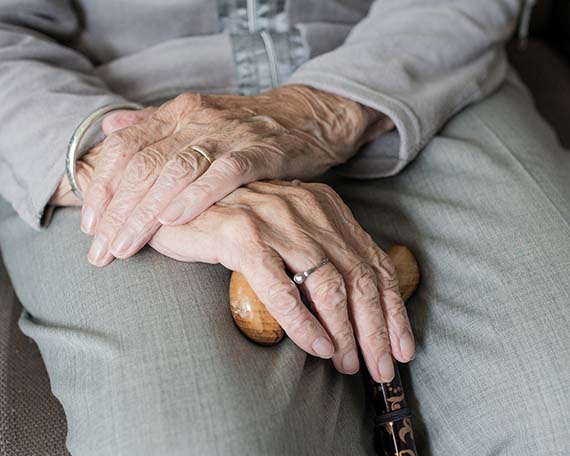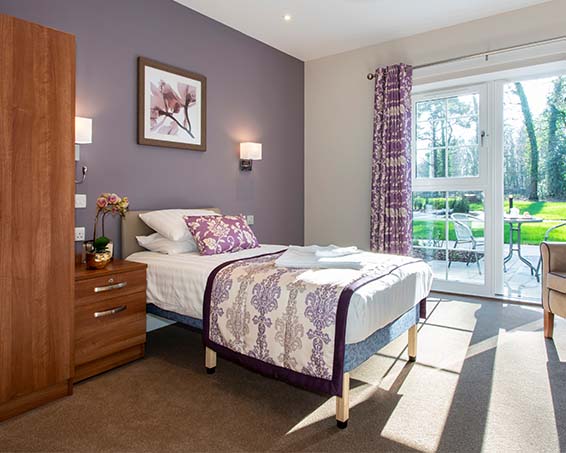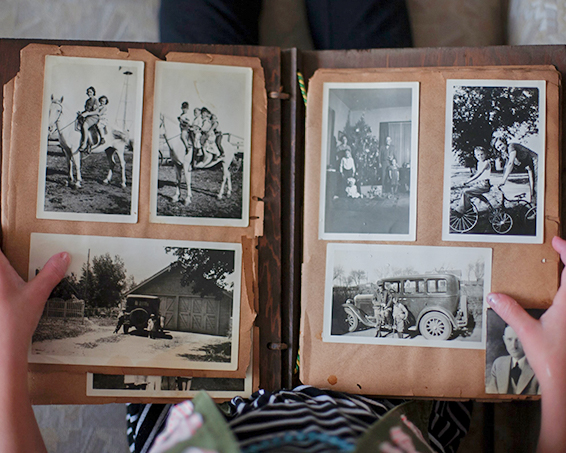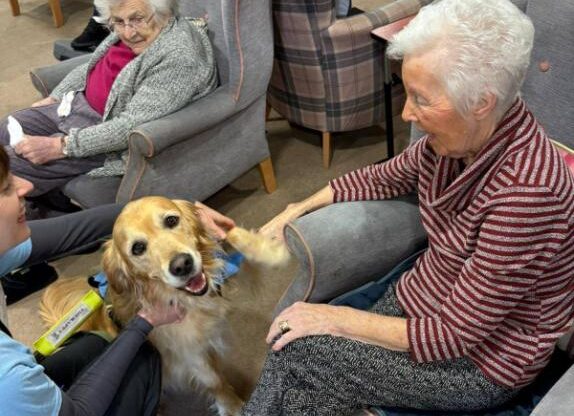What does a Dementia Friendly Environment Look Like?

The physical environment in which those with dementia live in can hugely impact them. Whether it’s in a person’s own home or a care home, if the environment is dementia friendly, it has the power to greatly improve the quality of life.
From assistive technology to understanding risk there are many elements that need to be considered and play an important part in supporting people living with dementia.
When designing a dementia-friendly environment there are many things to consider. Dementia’s progressive nature results in a unique journey for each person living with it. This condition typically means that care and support requirements are increased over time. As the condition progresses, an individual may at some point end up needing assistance with everyday personal care tasks as well as support with eating, communicating, medicine management and fine-motor activities. While this can be a difficult time to navigate through, there are many positive effects that a dementia-friendly environment can have; here are a few ways a dementia friendly environment can be achieved:
- Dining Areas
Dining areas should be recognisable, easy to walk around and have a clear layout. This can encourage independence and increase residents' confidence to navigate their way around the dining area. Additionally, if the dining area has appealing smells it can evoke positive feelings and memories as well as stimulate the appetite which is important as its common for those living with dementia to lose their appetite. Things to be considerate of when designing a dementia-friendly dining area include:
- Keeping the table free from clutter
- Avoiding heavily patterned items and furnishing
- Supplying easy-to-hold cutlery and plates with a lip to help avoid slips and spills
- Playing soothing music at mealtimes
- Switching off any distracting background noise and avoiding distracting movement
- Using wipe-clean mats and covers
- Bedrooms
Bedrooms should be designed to be a private, safe and welcoming place which promotes calmness and encourages a good night's sleep. Those living with dementia may need help with finding and recognising their bedroom, so introducing clear signage and bright colours can help. Things to be considerate of when designing a dementia-friendly bedroom include:
- Getting into or out of bed
- Night time wandering
- Easy access to the toilet
- Devices that tell the date and time
- Clear space for daily tasks such as getting dressed
- Bathrooms
It is very important for a bathroom to be a safe place for a person with dementia to use with as much ease as possible. The correct set-up can help a person with dementia to maintain their dignity and independence over personal care. Things to be considerate of when designing a dementia-friendly bathroom include:
- Protection against scalding
- Risk of falls
- Floor colour perception
- Calming and non-confusing decor
- Gardens
It is known that individuals with dementia are less likely to become agitated and distressed if they have regular access to fresh air and a quiet space away from others as needed. The garden can be a wonderful, peaceful place to enjoy; outside areas should be safe and secure like all other living spaces, encouraging independence for all abilities. Things to be considerate of when designing a dementia-friendly garden include:
- Accessibility
- Ensuring the garden is well-managed
- Including multiple seating options
- Including sensory stimulation
- Eliminating hazards
- Encouraging garden activities such as watering the plants
- Lighting
Clear, effective lighting can be beneficial for people with dementia. Considerate lighting will help individuals with dementia see where they want to go and identify rooms, equipment and signs. It helps people to see other people's faces and body language, to join in everyday routines, and to participate easier in activities. Things to be considerate of when designing a home with dementia-friendly lighting include:
- Introduce natural sunlight by opening curtains and ensuring windows are clear of trees and bushes
- Making light switches clear and easy to use
- Implementing automatic light sensors where possible
- Noise
Hearing can have a significant impact on people with dementia. To be considerate of those living with dementia, noise levels should be reduced and the space carefully designed; using noise-absorbing materials, and the thoughtful use of decor and furnishings can all help with this. Things to be considerate of when designing a home with dementia-friendly noise include:
- Incorporating materials that absorb sound, such as carpets and curtains
- Reducing background noise
- Ensure residents receive regular hearing tests
- Providing quiet areas where residents can have time to themselves
- Assistive Technology
Technology can be used in a variety of ways to help people with dementia in their daily living, and is known as 'assistive technology'. From stairlifts to flood detectors, there is a multitude of technologies that can help aid day-to-day life for the elderly, including a person living with dementia. Assistive technology has the power to enhance and/or improve the following:
- Memory problems
- Communication, including speech and hearing
- Mobility
- Safety inside and outside the home
- Maintaining independence
- Socialising
Dementia-Friendly Environments at a Care Home
- A Safe and Secure Environment
A considerate care home will strive to create a safe and homely atmosphere where noise and bright lights are reduced, which is particularly important for residents who have dementia. A warm, welcoming and easily understood environment is pivotal to both dementia residents and their loved ones, providing reassurance to all. `some care homes may have a specific unit for those living with dementia and a purpose-built care home will have considered all residents, including those living with dementia.
- Engaging, Accessible Activities
A care home offering dementia care should encourage individuals to continue doing what makes them happy, whether it’s enjoying a Sunday lunch with loved ones or taking part in an arts and crafts session. Activity Coordinators will ensure an Activities Programme is engaging and accessible for all abilities, including those living with dementia. It’s important to provide individuals with everything they need to live the life they deserve, with the option of enjoying their days quietly and alone or socialising with fellow residents.
- Skilled Staff
A care home carefully selects a dedicated team of health and social care professionals to look after all residents, and ensure there are full-time staff onsite who are qualified and experienced in providing specialist dementia care. Compassionate staff will go above and beyond in all they do, working with residents who live with dementia alongside their families to discover activities and therapies that are suited for their unique requirements and abilities.
- Support for Family & Friends
From initial diagnosis of dementia through to ongoing management of the condition, care homes are equipped to provide medical and emotional support to both residents and their loved ones.



Dementia Care at Bothwell Castle
Bothwell Castle Care Home in Uddingston, South Lanarkshire is proud to offer Dementia Care to those who are living with the condition. Our care home has been thoughtfully designed to provide a safe, caring and welcoming atmosphere for those living with dementia as well as all of our other residents and their relatives. We understand the difficulties that living with dementia can bring, and the impact that this also has on loved ones. We are here to provide constant guidance and support to existing and prospective residents as well as their loved ones to help them with such challenges.
“My father was admitted to Bothwell Castle Care Home earlier this year following subdural haematomas and requisite surgery at The Queen Elizabeth Hospital in Glasgow. The Care Home has been utterly outstanding both in caring for him and helping him to recuperate. He has also now been diagnosed with early onset dementia and the complicated logistics of transferring him from the hospital and both admitting him and assessing him was carried out professionally and faultlessly. He is settled and now fully physically recovered. He has made friends and is enjoying life. The care home staff have been outstanding not only in looking after him but in helping my mother adjust to life on her own. They have facilitated almost every need, quite often at short notice, and even arranged a family Graduation Afternoon Tea for my daughter/his granddaughter. This is a prime example of the thoughtfulness of everyone involved in my fathers care. I simply cannot thank them enough.”
Review from Kat T, Daughter of Resident via carehome.co.uk.
The employees of Bothwell Castle have had extensive dementia training and understand what is required to provide comprehensive dementia care in a suitable environment. Our staff go above and beyond and take pride in offering the best level of care and respect to each and every one of our residents.
Speak to Us Today
If you have any questions regarding Dementia Care at Bothwell Castle Care Home, we welcome you to get in touch. Call 01698 622 299 or email info@bothwellcastle.com to chat to our friendly team.





